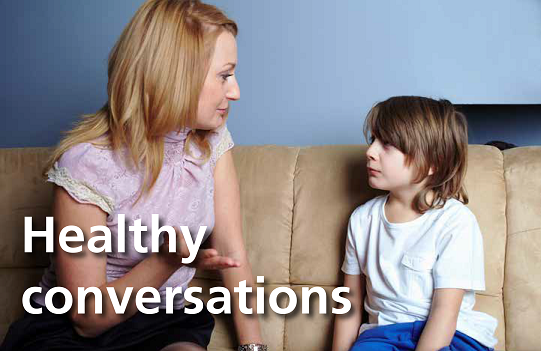Danny Sinclair, PHA, explores with Elaine Hoey, Clinical Lead at Relate NI, how parents can approach challenging COVID-19 conversations.

Talking honestly about COVID-19
Even young children know that something big is happening. Their routine, school life and home life have been turned upside down. Soon they will be returning to school, to another ‘new normal’. The whole population is adapting to an evolving set of COVID-19 safety measures and with these changes, can come further angst.
An honest, supportive relationship with your child is important to reduce the impact COVID-19 is having on them and any worries they may have. This article, between Relate NI and PHA, aims to discuss ways we can keep COVID conversations with children healthy and honest.
‘When will all this be over?’ is probably a question that parents and carers around the globe are hearing on a regular basis. So how do we answer?
The truth is we don’t know how long this will go on for and what life will look like afterwards. It is hard to make sense of the uncertainty. For children, it can be so much more difficult - a few weeks can feel like a lifetime. However, for children, learning how to manage uncertainty is an important life skill and can help to build resilience.
Leading experts share their guidance and first up, is to be honest. Explain to your child that while you cannot give them an exact answer, you are following the news/media coverage and will tell them once you find out. Give clear, age-appropriate information based on your child’s temperament and personality. You don’t need to give all the upsetting facts to very young children, a simple and clear explanation that some people are very sick and that the doctors are working hard to try and make them better is enough. It is also useful to explain to children that although we don’t have all the answers, professionals (such as scientists and government officials) are doing everything they can to try and work out solutions and cures.
Make it an ongoing conversation. If you haven’t already explained what is going on, firstly ask your children what they know. This gives an opportunity to share facts and clear up any misinformation. Children know that something big is happening. Avoiding talking about it will only make them worry even more.
Validate their feelings. Explain to children that you understand how they are feeling and that it is ok to talk about it. Encourage them to say how they are feeling and express any worries they have. Let them know how you feel, and share the ways in which you deal with those feelings.
Emphasise safety and security. Provide reassurance. Children need to hear that they are safe, and need to know who will be there to take care of them. Give lots of hugs and reassuring words like ‘we love and care about you’.
Focus on the present. Encourage children to take each day at a time and not give too much energy to the future. Remind them of fun times you have had during lockdown, which show the benefit of living in the moment and learning to enjoy every experience.
Highlight what is in their control. Focus on here and now and what they are in control of, such as handwashing, wiping surfaces, helping other people. Getting children to write lists of what they look forward to doing can help them feel a sense of control and independence.
Promise to keep them updated about any changes and about returning to school. Reassure them that you are watching the news but don’t expose very young children as this can be distressing and developmentally inappropriate.
Stay positive and use a calm voice– this conveys a sense of confidence and a feeling that everything will be ok. Remind them that this is only temporary and we will get back to our normal lives.
For more information on healthy relationships during COVID-19, see www.relateni.org/images/RelateNI-HealthyRelationships.pdf or visit www.relateni.org/covid19relationshipsupport
Information on Family Support Services in Northern Ireland
PHA/NCB article - Family Time During COVID-19
For support specifically for parents, freephone Parentline on 0808 8020 400.
